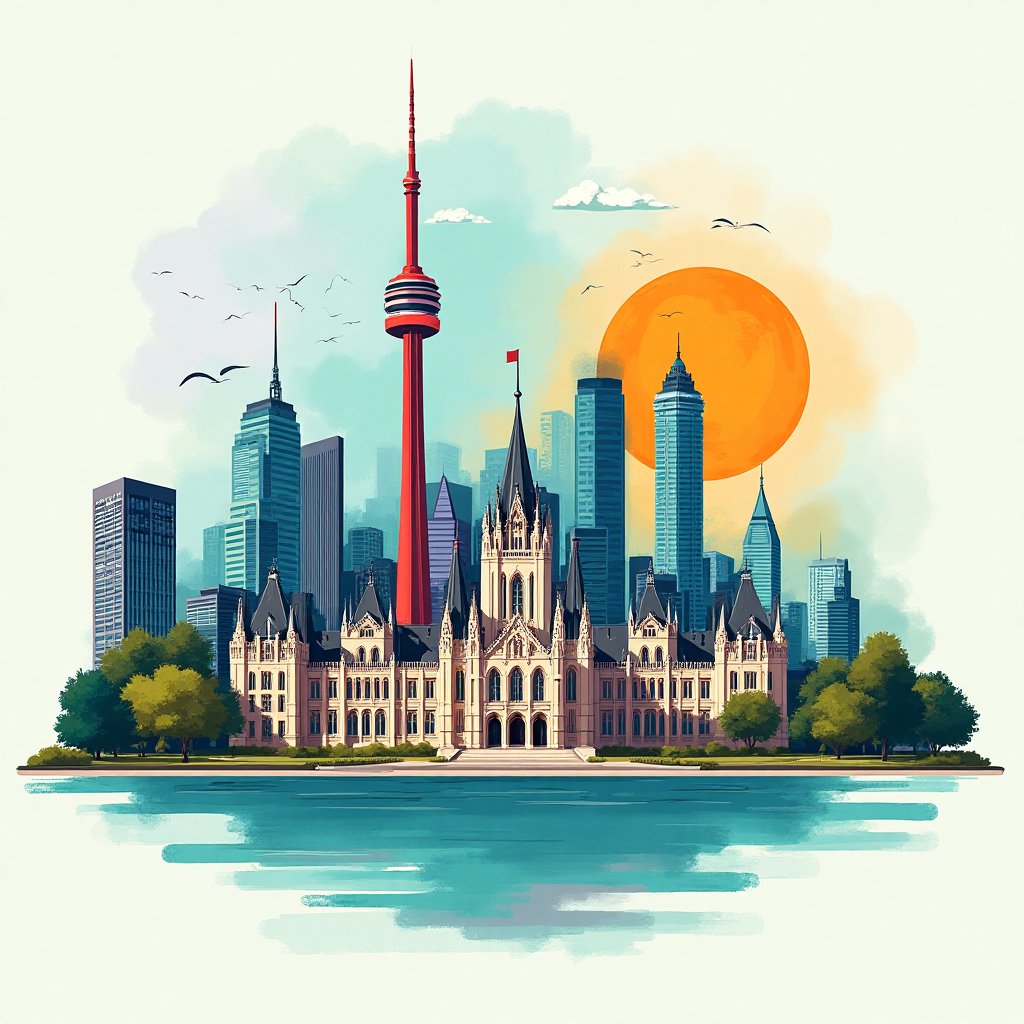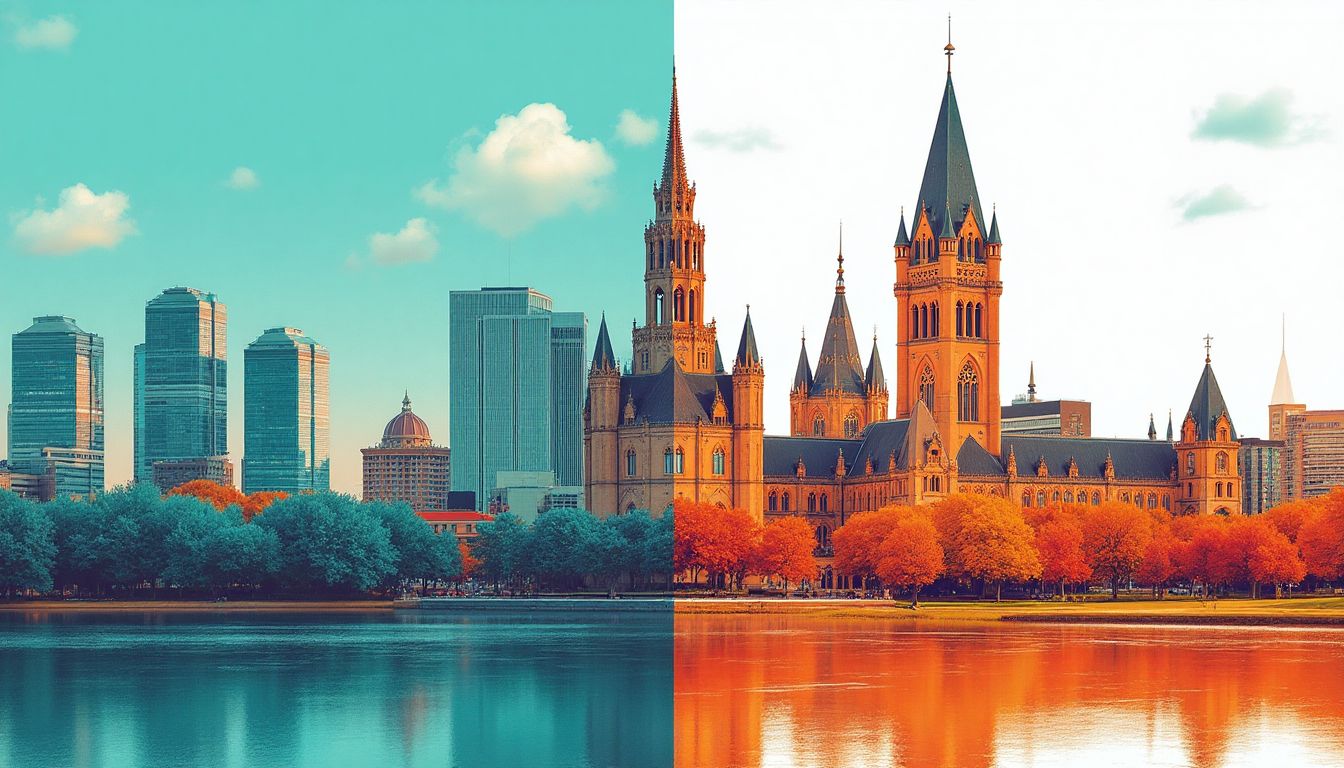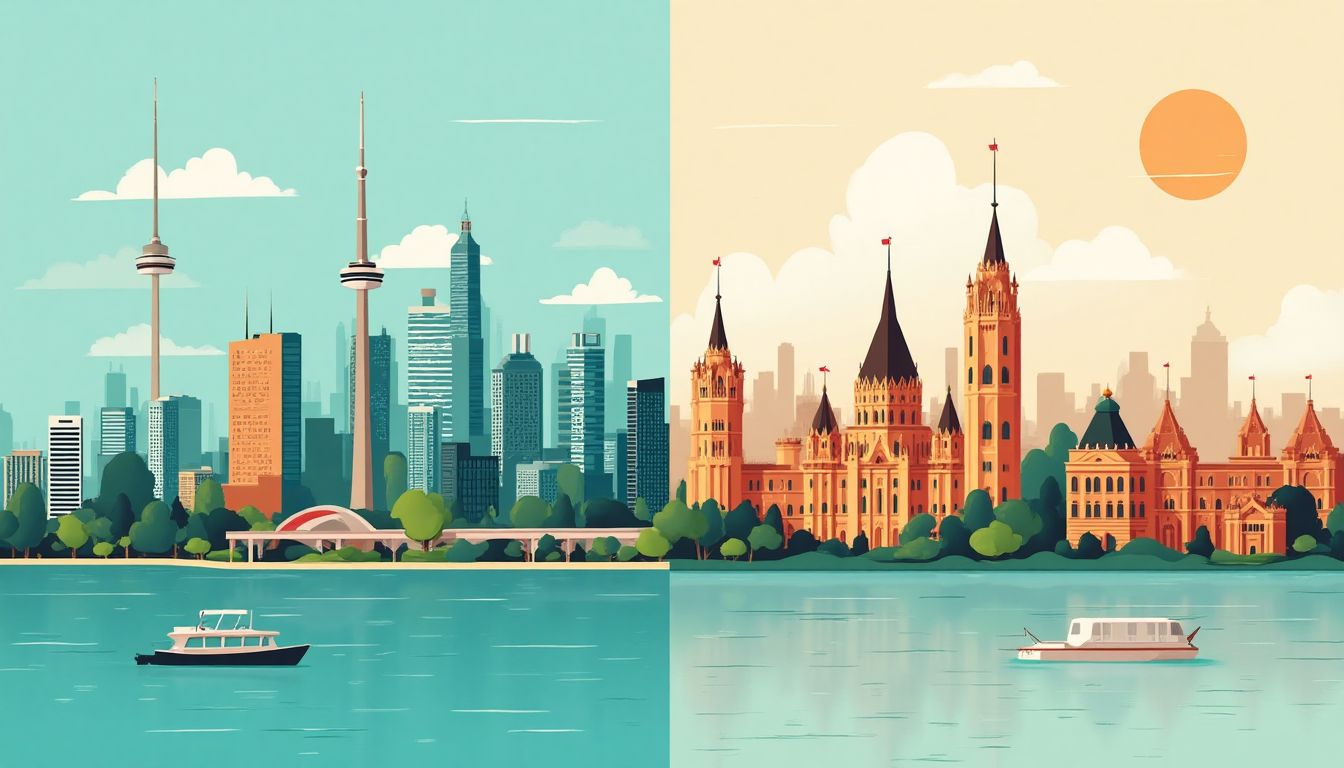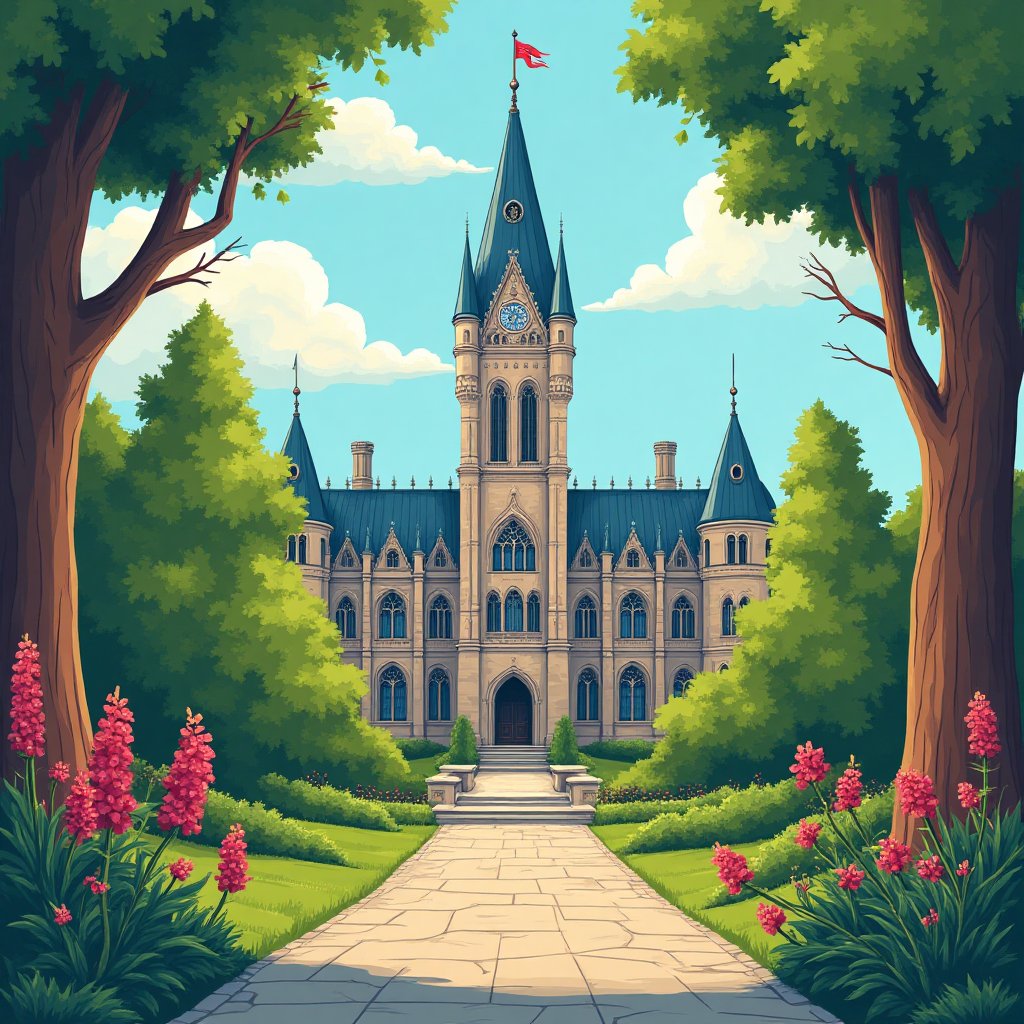Toronto and Ottawa: two cities, two vibes, and one burning question—which one is better? It’s like comparing a high-energy rock concert to a cozy jazz lounge. Toronto, the bustling metropolis, is Canada’s answer to New York City, with its towering skyscrapers, multicultural neighborhoods, and a pace that never slows. Ottawa, on the other hand, is the calm, collected capital, where politics, history, and nature blend seamlessly. But which city truly reigns supreme? This isn’t just a debate about geography; it’s about lifestyle, opportunity, and where you’ll find your happy place. Renowned urbanist Jane Jacobs once said, “Cities have the capability of providing something for everybody, only because, and only when, they are created by everybody.” Meanwhile, economist Richard Florida has long championed the role of cities in fostering creativity and innovation. And let’s not forget Malcolm Gladwell, who’s explored how our environments shape our decisions. So, which city will shape yours? For more local insights, check out Toronto News and Ottawa News.
When it comes to cost of living, Toronto and Ottawa are like siblings with very different spending habits. Toronto is the older sibling who’s always splurging on the latest gadgets, while Ottawa is the frugal one who knows how to stretch a dollar. Let’s break it down.
Housing affordability is where the two cities diverge dramatically. Toronto’s real estate market is like a rollercoaster—exciting but terrifying. The average home price in Toronto is significantly higher than in Ottawa, and renting isn’t much better. According to the Canada Mortgage and Housing Corporation, Toronto’s rental vacancy rate is among the lowest in the country, driving prices up. Ottawa, on the other hand, offers more reasonable options for both buyers and renters. It’s like finding a hidden gem in a sea of overpriced treasures.
Daily expenses also tell a tale of two cities. Groceries, transportation, and even a cup of coffee tend to be more expensive in Toronto. Ottawa, with its smaller size and lower demand, keeps costs in check. For example, a monthly transit pass in Toronto costs more than in Ottawa, and you’ll likely spend more on groceries in the big city. But hey, Toronto’s higher costs come with perks—like access to world-class amenities and services that Ottawa can’t quite match.
Taxes and utilities add another layer to the cost-of-living puzzle. Ottawa residents enjoy lower property taxes compared to their Toronto counterparts. However, Toronto’s utilities and services, while pricier, are often more advanced and reliable. It’s a trade-off: pay more for convenience in Toronto or save money in Ottawa but deal with fewer frills.
Job Opportunities
Industry Diversity
When it comes to job opportunities, Toronto and Ottawa are like two different flavors of ice cream—both delicious, but catering to different tastes. Toronto, often dubbed the financial capital of Canada, is a magnet for professionals in finance, tech, and media. The city is home to the Toronto Stock Exchange and a thriving startup ecosystem. If you’re dreaming of working in a skyscraper or launching the next big app, Toronto might be your jam.
Ottawa, on the other hand, is the political heart of Canada. It’s where the Government of Canada operates, making it a hotspot for public sector jobs. But don’t let the politics fool you—Ottawa is also making waves in the tech world. Known as Silicon Valley North, the city is home to tech giants like Shopify and a growing number of startups. So, whether you’re a policy wonk or a tech geek, Ottawa has something for you.
Salary Comparisons
Let’s talk money. Salaries in Toronto are generally higher, but so is the cost of living. It’s like getting a bigger slice of cake, but the cake itself is more expensive. According to recent data, the average salary in Toronto is around $60,000, while in Ottawa, it’s closer to $55,000. But when you factor in housing and daily expenses, Ottawa might give you more bang for your buck.
Ottawa also offers a better work-life balance. The city’s slower pace means you’re less likely to be stuck in a soul-crushing commute or working late nights. So, if you value your sanity as much as your paycheck, Ottawa could be the better choice.
Entrepreneurship and Startups
If you’re an entrepreneur, both cities have their perks. Toronto’s vibrant startup scene is like a bustling marketplace, full of opportunities and competition. The city is home to University of Toronto’s entrepreneurship programs and numerous incubators like MaRS Discovery District.
Ottawa, while smaller, offers a supportive ecosystem for small businesses. The city’s Invest Ottawa program provides resources and mentorship for startups. Plus, the lower cost of living means you can stretch your startup budget further. So, whether you’re pitching to investors in Toronto or networking in Ottawa, both cities offer fertile ground for innovation.
Lifestyle and Culture
Arts and Entertainment
When it comes to arts and entertainment, Toronto is like a never-ending festival. The city boasts world-class theaters like the Mirvish Theatres, iconic museums like the Art Gallery of Ontario, and festivals like TIFF. If you’re a culture vulture, Toronto will keep you busy.
Ottawa, while more laid-back, offers its own cultural gems. The National Gallery of Canada and the Canadian Museum of History are must-visits. The city’s historic sites, like Parliament Hill, add a touch of grandeur to its cultural scene. So, whether you’re into blockbuster exhibitions or historic tours, both cities have you covered.
Outdoor Activities
If you love the great outdoors, Ottawa has a clear edge. The city’s proximity to nature and the Rideau Canal provides ample opportunities for hiking, biking, and skating. In the winter, the canal transforms into the world’s largest skating rink—a true Canadian experience.
Toronto’s parks and waterfront are popular, but they can get crowded. Places like High Park and the Toronto Islands are great for a day out, but you might have to fight for a picnic spot. So, if you’re looking for more space to roam, Ottawa might be your outdoor haven.
Food and Dining
Toronto’s diverse culinary scene is like a global food tour. From Chinatown to Little Italy, the city offers a smorgasbord of international flavors. Whether you’re craving dim sum, tacos, or poutine, Toronto has it all. The city’s food scene is so vibrant, it’s practically a sport.
Ottawa, while smaller, offers a mix of local and international flavors. The ByWard Market is a foodie’s paradise, with everything from artisanal cheeses to gourmet donuts. And let’s not forget Ottawa’s famous Beavertails—a must-try for any visitor. So, whether you’re a foodie or just love to eat, both cities will satisfy your cravings.
Education and Family Life
When it comes to education and family life, both Toronto and Ottawa have a lot to offer, but they cater to different needs and preferences. Let’s break it down.
Schools and Universities
Toronto is home to some of Canada’s most prestigious educational institutions, including the University of Toronto, consistently ranked among the top universities globally. The city also boasts a wide range of public and private schools, offering diverse programs for students of all ages. Ottawa, on the other hand, is known for the University of Ottawa, which is renowned for its bilingual programs and strong focus on research. The city also has excellent public schools and a variety of specialized programs for families.
Family-Friendly Amenities
Ottawa’s quieter neighborhoods and abundance of parks make it an ideal place for families. The city is home to the Rideau Canal, a UNESCO World Heritage Site, which offers year-round activities like skating in the winter and boating in the summer. Toronto, with its diverse communities and endless activities, caters to families of all backgrounds. From the Toronto Zoo to the Royal Ontario Museum, there’s always something to do.
Safety and Community
Both cities are considered safe, but Ottawa’s smaller size fosters a stronger sense of community. Neighborhoods like The Glebe and Westboro are known for their friendly atmosphere and community events. Toronto’s diverse neighborhoods, such as The Annex and Leslieville, offer a vibrant community life but can feel more fast-paced.
Transportation and Accessibility
Getting around in a city can make or break your experience. Here’s how Toronto and Ottawa stack up in terms of transportation and accessibility.
Public Transit
Toronto’s TTC is one of the most extensive public transit systems in North America, covering buses, streetcars, and subways. However, it’s often crowded, especially during peak hours. Ottawa’s OC Transpo is efficient and expanding, with a focus on bus rapid transit and light rail. The Confederation Line has significantly improved connectivity in the city.
Traffic and Commute Times
Toronto’s traffic is notorious, with long commute times being a common complaint. The city’s highways, like the 401, are often congested. Ottawa, being smaller, has less traffic, making commuting generally easier. However, the city is not immune to rush hour delays, especially on major routes like the Queensway.
Walkability and Bike Lanes
Ottawa’s bike-friendly infrastructure and walkable neighborhoods are a big plus. The city has an extensive network of bike lanes and paths, including the Ottawa River Parkway. Toronto’s walkability varies by area, with neighborhoods like Downtown and The Beaches being highly walkable, while others require more reliance on public transit or cars.
AI Solutions: How Could AI Help?
Artificial Intelligence (AI) is no longer just a buzzword; it’s a transformative force reshaping industries and cities. When it comes to comparing Toronto and Ottawa, AI can play a pivotal role in helping individuals, businesses, and governments make smarter decisions. Here’s how AI could revolutionize the way we think about urban living and city comparisons.
Data-Driven Decision Making
AI can analyze vast amounts of data on housing, job markets, and lifestyle factors to provide personalized recommendations. For instance, platforms like Zillow already use AI to predict housing trends. Imagine a tool that combines housing data with job opportunities, commute times, and even local school ratings to help you decide whether Toronto or Ottawa is the better fit for your lifestyle. Companies like IBM Watson are already pioneering such solutions, and their applications could be tailored to city comparisons.
Smart City Integration
AI-powered systems can optimize public transit, reduce traffic congestion, and improve urban planning. For example, Sidewalk Labs has been experimenting with AI to create smarter, more efficient cities. In Toronto, AI could help manage the notorious traffic on the 401 highway, while in Ottawa, it could enhance the efficiency of the OC Transpo system. By integrating AI into city infrastructure, both Toronto and Ottawa could become more livable and sustainable.
Predictive Analytics
AI can predict future trends in cost of living, job markets, and population growth. For instance, McKinsey & Company has used AI to forecast economic trends with remarkable accuracy. By applying similar models to Toronto and Ottawa, AI could help residents and policymakers anticipate changes and make informed decisions. This could be particularly useful for young professionals deciding where to start their careers or families looking for the best place to raise children.
Action Schedule/Roadmap
To implement these AI solutions, here’s a detailed roadmap that institutions, organizations, and governments can follow:
- Day 1: Assemble a team of data scientists, urban planners, and AI experts. Partner with universities like the University of Toronto and the University of Ottawa to leverage academic expertise.
- Day 2: Gather comprehensive data on housing, job markets, transportation, and lifestyle factors in both cities. Collaborate with local governments and organizations like the Statistics Canada for accurate data.
- Week 1: Develop AI algorithms to analyze and compare the data. Use platforms like TensorFlow and PyTorch for machine learning models.
- Week 2: Create a user-friendly platform for personalized city comparisons. Partner with tech companies like Google and Microsoft for cloud infrastructure and user interface design.
- Month 1: Launch a pilot program in Toronto and Ottawa. Collaborate with local governments to integrate AI solutions into public services.
- Month 2: Collect feedback from users and refine the AI models. Use tools like SurveyMonkey to gather insights.
- Year 1: Expand the platform to other cities and regions. Partner with international organizations like the United Nations to promote global adoption.
- Year 1.5: Implement AI-driven urban planning initiatives. Use AI to optimize public transit, reduce traffic, and improve sustainability.
- Year 2: Evaluate the impact of AI solutions on city living. Publish findings in journals like Nature and Science to share best practices globally.
Which City Wins? The Final Verdict
Toronto and Ottawa are both incredible cities, each with its own unique charm and opportunities. Toronto, with its bustling energy and diverse culture, is a magnet for those seeking a fast-paced lifestyle and endless opportunities. Ottawa, on the other hand, offers a quieter, more affordable environment with a strong sense of community and a rich political history. The better city ultimately depends on your personal preferences and goals. Are you drawn to the bright lights and big city vibes of Toronto, or do you prefer the laid-back, family-friendly atmosphere of Ottawa? The choice is yours, and with the help of AI, you can make an informed decision that aligns with your lifestyle and aspirations. For more local insights, visit Toronto News and Ottawa News.
FAQ
Q1: Is Toronto more expensive than Ottawa?
Yes, Toronto is generally more expensive, especially when it comes to housing and daily expenses. For example, the average rent for a one-bedroom apartment in Toronto is significantly higher than in Ottawa. For more details on local housing trends, check out Toronto News and Ottawa News.
Q2: Which city has better job opportunities?
Toronto offers a wider range of job opportunities, particularly in industries like finance, tech, and media. Ottawa, on the other hand, is known for its government jobs and a growing tech sector. For more insights into job markets, visit LinkedIn or Indeed.
Q3: Is Ottawa better for families?
Ottawa’s quieter neighborhoods and family-friendly amenities make it a popular choice for families. The city offers excellent schools, parks, and community centers. For more information on family life in Ottawa, visit Ottawa News.
Q4: How does public transit compare?
Toronto’s TTC (Toronto Transit Commission) is extensive but often crowded, while Ottawa’s OC Transpo is efficient and expanding. For more details on public transit options, check out TTC and OC Transpo.
Q5: Can AI help me decide which city to move to?
Yes, AI can analyze data on housing, jobs, and lifestyle to provide personalized recommendations. For more on how AI is transforming decision-making, visit IBM Watson or Google AI.
Q6: Which city has better educational institutions?
Toronto is home to prestigious institutions like the University of Toronto, while Ottawa offers excellent schools and the University of Ottawa. Both cities provide a range of educational opportunities for students of all ages.
Q7: What are the main cultural differences between Toronto and Ottawa?
Toronto is known for its diverse population and vibrant arts scene, with numerous theaters, museums, and festivals. Ottawa, as the nation’s capital, offers a more relaxed cultural experience with national galleries and historic sites. For more on cultural events, visit Toronto Festivals and Ottawa Events.
Q8: How do the outdoor activities compare?
Ottawa’s proximity to nature and the Rideau Canal provides ample outdoor opportunities, while Toronto’s parks and waterfront are popular but often crowded. For more on outdoor activities, check out Parks Canada and Toronto Parks.
Q9: Which city is safer?
Both Toronto and Ottawa are considered safe cities, but Ottawa’s smaller size fosters a stronger sense of community. For more on safety statistics, visit Toronto Police and Ottawa Police.
Q10: How do the food scenes compare?
Toronto’s diverse culinary scene is unmatched, offering a wide range of international cuisines. Ottawa offers a mix of local and international flavors, with a focus on farm-to-table dining. For more on dining options, visit BlogTO Restaurants and Ottawa Magazine Restaurants.
Wait! There's more...check out our gripping short story that continues the journey: The Pulse of Toronto
Disclaimer: This article may contain affiliate links. If you click on these links and make a purchase, we may receive a commission at no additional cost to you. Our recommendations and reviews are always independent and objective, aiming to provide you with the best information and resources.
Get Exclusive Stories, Photos, Art & Offers - Subscribe Today!





























1 comment